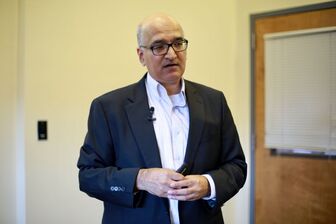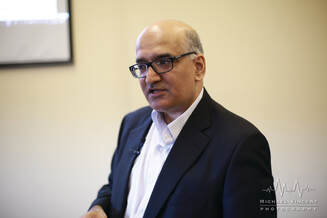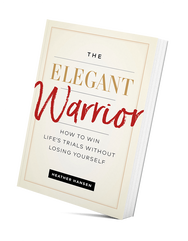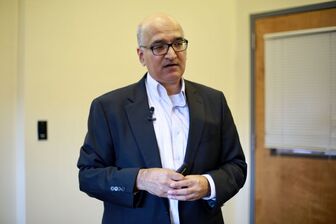|
You probably have heard many times that you got to have a message if you want to succeed at anything. This is partly true. Having a message is step one, there are four other steps that are necessary for success that no one ever points out. I will point out all five steps and then show, as an example, how Bernie Sanders is so effective on messaging. Look, you don't have to like Bernie or vote for Bernie, but you have to admit that no one does messaging better than Bernie. Because of his messaging, he is very likely to win the Democratic nomination and possibly, with some luck, even the presidency in the general election against Donald Trump. First, let me list the five steps of messaging for success:
Who does this better than Bernie? No one. Step 1: Have a message that is simple Bernie has a message that is captured in this simple slogan "Not me. Us." Bernie keeps repeating that he can't start a revolution by himself. He needs help and must bring new voters to enact the change that people want. Based on his success, his message is resonating with at least the plurality of Democratic voters right now. Step 2: Be the message so you have credibility Bernie is the message. You may not agree with Bernie's socialist programs or policies, but he has always been consistent and has not changed any views for political exigency. Bernie has credibility and that's why he attracts younger voters. Younger voters want to believe and are gravitated toward someone who speaks to their needs, and they surely believe Bernie. One more thing: To delver a message that sticks, you have to be the right messenger. And Bernie is the right messenger for the message he is sharing. A message often does not connect with people when there is an inconsistency between the message and the messenger. Step 3: Deliver the message clearly, concisely, purposefully and impactfully Bernie does this better than anyone. When he speaks, you know he means it, and his supporters believe it. And do you know who else believes it? Billionaires. CEOs, Republicans, and especially President Trump. Don't believe for a moment that President Trump wants to go up against Bernie Sanders. Trump and the Republicans like to portray Bernie as crazy to please their base, but it is those that are deemed crazy create movements and shake the world. Step 4: Ensure others believe in your message as if it is their own message Bernie is not convincing people that already don't believe in what he is saying. Others are drawn to his cause because they are saying things that Bernie is saying it in public. Bernie in a sense is the messenger they have been waiting for. And he is close to getting them to the promised land. Step 5: Encourage others to spread your message and persuade others to join the movement Bernie knows that he can't achieve anything unless he gets others to believe in his message so that they want to join the movement and persuade others to do the same. That is how all movements get created. It starts small and keeps growing until there is no way to stop it. Will Bernie win? No one knows. But one thing I do know is that he is doing everything right about messaging that I would not bet against him. Don't hate Bernie, learn from him When you want something, you must learn how to do messaging right. It is not enough to have a message. You must be the message. Next, you must be able to deliver the message. Get others to believe in your message as if it is their own message. Last, get others to spread your message and evangelize others to support you. This is how Gandhi led India to freedom. This is how Martin Luther King was able to get Congress to pass the Civil Rights and Voting Rights bills. Though all you may want is to get a good high paying job or get funding for your project, the five steps of messaging are still the same. Without that, it is hard to win. #####  Jay Oza is an author, speaker, executive coach. He makes people thrive on high stakes stage whether it's for a job interview, a sales presentation or a high-stakes speech. He is the author of the book Winning Speech Moments: How to Achieve Your Objective with Anyone, Anytime, Anywhere. Please download the speech checklist that you can use to help you with your next high stakes speech. Please contact him if you would like to have a two 75 minute coaching session on job interviewing or high-stakes speaking or interested in inviting him to give a talk on job Interviewing or high-stakes speaking at your event. You can reach him at [email protected].
0 Comments
We had a Democratic debate on Wednesday (2/29/2020). It was Michael Bloomberg's first chance to duke it out with other debate-hardened candidates in Elizabeth Warren, Joe Biden, Bernie Sanders, Pete Buttigieg, and Amy Klobuchar. If you watched the debate, you would agree that Bloomberg did not perform well. Though he had his moments, he did not do well on a high-stakes stage that had the highest ratings of any previous Democratic debates. We all know that Bloomberg is wealthy, a great businessman, a three-term successful mayor of New York City, very charitable, and a tough manager. But one thing he wasn't was a good debater on Wednesday. Though he has spent over $400 million on advertisements on TV and social media, he could not buy a solid performance on the high-stakes debate stage in Las Vegas. What happened? It could be one, some or all of these things: He was not well prepared; he did not know what to expect; he realized perhaps he did not want to be president as much as the other candidates; he may have thought that showing up was enough; he was above it all to duke it out with the other candidates. I like to believe that he was not well prepared. And it showed. I will focus on three areas that he should have hit it out of the park. Who are you? Bloomberg never told his story on how he went from a middle-class background to Wall Street to start his successful company to a three-term mayor to future president. He did not say it. The burden was on him to say it when so many people were watching. He had to be his best salesman for his narrative. Commercials don't help when you are on the high-stakes debate stage. There is no excuse for this mistake for anyone, let alone a person as smart, experienced, and successful as Michael Bloomberg. Capitalism When Bernie Sanders said that Bloomberg was richer than 125 million people, all Bloomberg had to come back with was a simple answer. He should have said that he was a billionaire for one simple reason: The company he founded has added significant value to others. That's how you become a millionaire, multi-millionaire and billionaire in America. Simple and to the point. Buying the Election When he was accused of buying the election. His hand should have gone up immediately. And he should have said he did not buy any votes. He was getting the message out. It is something they are all doing. He has to spend money since he is not as well known as others, and he entered the race late, so he has a lot of catching up to do real fast. But he was running to defeat Donald Trump for one simple reason: He wants America to remain America where the president, his party, and the people believe in the Constitution, democracy, law, and facts. All we got was that he wanted to defeat Donald Trump but did not have any oomph to it. Bloomberg will get another chance next week, and it may be his last chance to stay in the game. He better be well prepared if he wants to be president. A lot of people will be watching. He better put on an excellent performance when it matters. A lesson we can all learn from Bloomberg's poor debate performance Whether you are going for an entry-level job or want to become the president of the United States, you must perform when the stakes are high. High stakes for presidential candidates is the debate forum. It is in this forum people can judge you against others. You have to show you can articulate your ideas, defend your ideas and record, and attack effectively without losing your cool in a very short amount of allotted time. You got to bring your A-game to win. You got to be LeBron on the debate stage. You have to show you got what it takes to be the president. You have to do the same when you want something such as a job. You have to show up, stand out, secure an offer and then succeed. #####  Jay Oza is an author, speaker, executive coach. He makes people thrive on high stakes stage whether it's for a job interview, a sales presentation or a high-stakes speech. He is the author of the book Winning Speech Moments: How to Achieve Your Objective with Anyone, Anytime, Anywhere. Please download the speech checklist that you can use to help you with your next high stakes speech. Please contact him if you would like to have a two 75 minute coaching session on job interviewing or high-stakes speaking or interested in inviting him to give a talk on job Interviewing or high-stakes speaking at your event. You can reach him at [email protected].  What can we learn from lawyers? A lot. Lawyers advocate for their clients in front of jurors who will make the critical decision whether to acquit or convict their clients. That is high stakes. The skills lawyers use to advocate for their clients are the same skills we all have to learn and master to effectively advocate for ourselves and others, when necessary. Heather Hansen has written an excellent book, "The Elegant Warrior" that teaches us how to effectively advocate for our position in life, business and at home. She has captured this in her book from her twenty years of experience working as a lawyer. The book is short and simple but packs a lot of punch. I learned a lot from this book; hence, I had so many questions after reading it that Heather was kind enough to answer a few of them below. I highly recommend you get this book, read it, study it, and practice what Heather teaches. Soon you will start seeing results when you have to advocate for yourself if you want to win. As Heather points out, if you are well prepared and ready to fight, the other side will be highly motivated to settle with you rather than duke it out with you in a trial which is unpredictable. Now, don't you wish you had this critical skill for success? You can learn more from Heather by listening to her podcast The Elegant Warrior Podcast with Heather Hansen. Also, you can get more information about Heather Hansen on her website heatherhansenpresents.com. Question 1 When someone tells a story, how do you know that you are not being manipulated? The short answer is practice. Twenty years of watching people answer questions at deposition and at trial have made me adept at reading the tone of voice and body language. But the best way to be sure is to compare the story to other evidence. For example, if you're a customer going to buy a car, you have the evidence of competitors' prices, online reviews, past experience with cars. Some types of evidence are more relatable than others. Still, I try to collect as much evidence as possible before making a judgment, and I recommend others do the same. Question 2 Do you role play with your clients before putting them on the stand so they are well prepared to handle anything the opposing attorney may throw at them? Yes! Role-playing is vital any time you have to advocate for yourself. Being on the stand is stressful and completely outside of my clients' comfort zone. The more we practice the more comfortable it becomes. And if I can ask tougher questions in our "mock cross exams" than opposing counsel does at trial, I've done my job. Question 3 What keeps the jury's attention in a case since people today don't have a long attention span? Isn't this a challenge today not only for lawyers but non-lawyers too? You'd be surprised at how invested jurors become. Most people don't want to be chosen, but once they are, they work hard to pay attention. That said, they do fall asleep. Often. I find my voice is helpful because I'm often the only woman in the courtroom. Surprises keep jurors interested, and my voice is a surprise after hearing male voices for hours. I try to incorporate other surprises too. Question 4 As you mention in your book that jurors are human, so do they occasionally get swayed by lawyer's performance more than the evidence that the lawyer has presented? Yes. In many ways, a trial is often like theater, and the one who puts on the best show wins. I have never had a doctor on one of my juries. But one thing I have going for the doctors I represent in a trial is that every juror is a patient. So I think, as humans, jurors are more swayed by their personal experiences and perspectives as a patient. And that is hard to overcome. Question 5 You write not to "fake it 'till you make it," but grow it. But don't we all occasionally have to fake it to get a foot in the door so we get the opportunity to grow it. I think faking it never works. I think you have to find something inside that you have real confidence in and show that until it grows. I know juries can read fake from a million miles away, and they hate it. But if a client shows them some humor, some confidence, some love for what they do, the jury responds with interest, and then the confidence grows. Bonus Question You wrote short chapters that got to the point. Is this based on how you would present a case to the jury by keeping it short, simple, and to the point? You use the following format: Heading, Famous Quote, Story with a Lesson, Proof, Summary. Is this something you ever use when you are presenting to the jury? It is similar. We also write briefs in a similar format. But I think my preference for short chapters comes from the TV Work I do. On TV, I have one minute to make my point. That makes you very aware of how much time you're taking from a person's life..... Five Book Recommendations by Heather Hansen: 1-To Sell Is Human: The Surprising Truth About Moving Others by Daniel Pink 2-The Boy, the Mole, the Fox and the Horse by Charlie Mackesy 3-Can You Hear Me Now? How to Connect with People in a Virtual World by Nick Morgan 4-Data Story: Explain Data and Inspire Action Through Story by Nancy Duarte 5-What Do You Do With an Idea? by Kobe Yamada #####  Jay Oza is an author, speaker, executive coach. He makes people thrive on high stakes stage whether it's for a job interview, a sales presentation or a high-stakes speech. He is the author of the book Winning Speech Moments: How to Achieve Your Objective with Anyone, Anytime, Anywhere. Please download the speech checklist that you can use to help you with your next high stakes speech. Please contact him if you would like to have a two 75 minute coaching session on job interviewing or high-stakes speaking or interested in inviting him to give a talk on job Interviewing or high-stakes speaking at your event. You can reach him at [email protected]. |
AuthorJay Oza Archives
July 2024
Categories
All
|
© 2017 Winning Speech Moments


 RSS Feed
RSS Feed